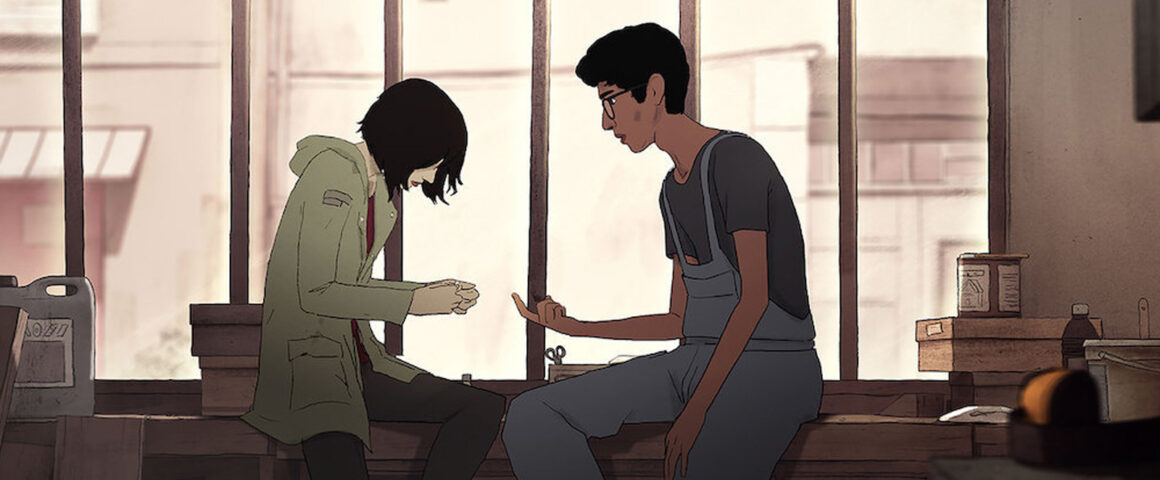“Yet if hope has flown away, in a night, or in a day, in a vision, or in none, is it therefore the less gone?” — Edgar Allen Poe
Winner of the Critics’ Week Grand Prize at the 2019 Cannes Film Festival, I Lost My Body is an animated film about the attempt to recover a part of one’s self which was once vibrant and alive, but is now hidden. Directed by Jérémy Clapin in his first feature film and nominated for Best Animated Feature at the 2020 Oscars, I Lost My Body is the story of a disembodied hand severed in a tragic accident which takes on a life and personality of its own as it seeks reunion with the body it lost. Though the hand has no outward means of self-expression, we hear the sounds it is hearing and seem to know what it is feeling and thinking.
Produced by Marc Du Pontavice (“Oggy and the Cockroaches” TV series) and adapted from the book Happy Hand by Guillaume Laurant (“Amelie”), according to Clapin, the film is “really showing how to find yourself and . . . how you have to survive, how you have to deal with fate and destiny.” Like a soul seeking to reunite with its source, the severed hand undertakes a desperate journey through Paris. As the score of Dan Levy sets an almost mystical tone, we are witness to the hand as it confronts sewer rats, flies through the air holding the handle of an umbrella, dodges subway trains and highway traffic, and escapes from a garbage truck and even the mouth of a hungry dog.
Amidst all of the grit, there is also a tender scene when the hand picks up a pacifier from the floor of a Paris bedroom near a baby’s cot and gently puts it back in the baby’s mouth, two helpless things seeking comfort from the other. The hand remembers the boy named Naoufel (voiced by Hakim Faris, “Sous X”) and the joy and sadness of his life and we revisit the past in black and white contrasted with the present in muted colors. Now a teenager, Naoufel once had a rich life full of promise — a family who loved him but died in an accident, and the dream of becoming a pianist or an astronaut, or both.
Set sometime in the 1990s, in the opening scene that portends a later discussion of destiny, Naoufel’s dad tells the boy how to catch flies. “Aim for the side,” he says, “Don’t go for where it is, but for where it will be,” but the lesson is hard to learn. In other flashbacks, we see a sullen Naoufel after the death of his parents struggling to live with adoptive parents who care little about him, sleeping on a single mattress on the floor of an unfurnished room, and working as a pizza delivery boy, always scolded by a grumpy boss for late delivery.
On a rainy night, while delivering a pizza, he crashes his bike, scattering remnants of pizzas over the sidewalk, and the dinner he is about to deliver ends up, as Naoufel puts it, looking “like one pizza on top of another that has been chewed.” When he talks over the intercom in an apartment building to the young woman on the 35th floor waiting for her pizza, however, something in him awakens, something that had long been dormant. After vigorously complaining about the pizza being late, Gabrielle (voiced by Victoire Du Bois, “Call Me by Your Name”) tenderly asks Naoufel if he was hurt when he crashed his bike. Surprised at her concern for his well-being, he longs to find her again.
Discovering that she works at a library, he checks out some books just to see her, then applies for a job as an apprentice working for Gabrielle’s uncle Gigi (voiced by Patrick d’Assumçao, “Marianne” TV series), a carpenter close to retirement. Unaware of his ulterior motive the boy is hired and provided room and board. Convinced that he has won over Gabrielle, the two stand on a balcony overlooking Paris and talk about letting go. Naoufel tells her that he believes everything is written in advance and that we think we can change things but it is just an illusion. The only way we can change things, he says, is to do something unpredictable, something completely irrational, transcendent, outside the boundaries of reason, the “Leap of Faith” attributed to Danish philosopher Søren Kierkegaard.
Gabrielle then asks him what you do after you’ve taken the leap and “dribbled past fate?” and he says, “You run blindly and keep your fingers crossed.” Sadly, when she realizes that he fooled her uncle just to get close to her, she turns away and leaves him alone on the roof. Running blindly and keeping his fingers crossed, Naoufel tries to fool destiny. Pursuing that leap of faith, he seeks the realization that we can create our life anew each moment, and that we may lose our body, but can never lose who we really are.




'Movie Review: I Lost My Body (2019)' has no comments